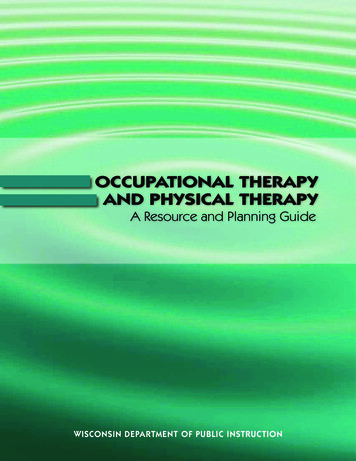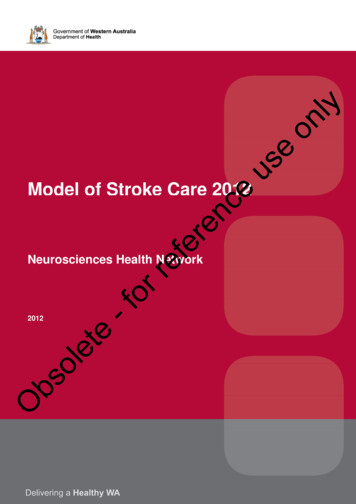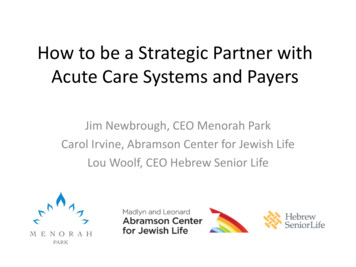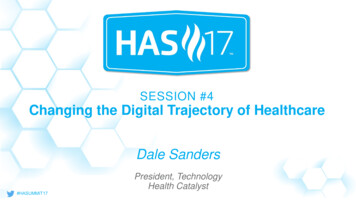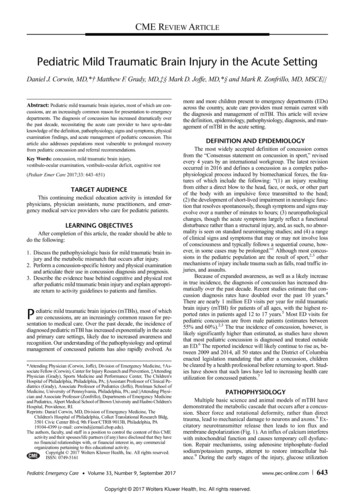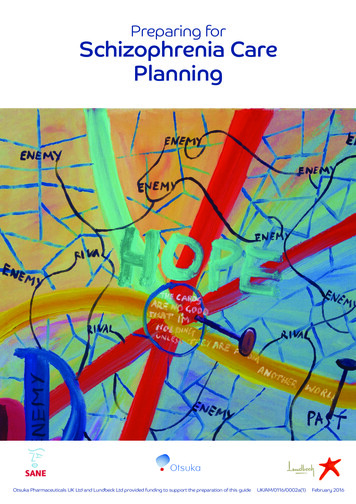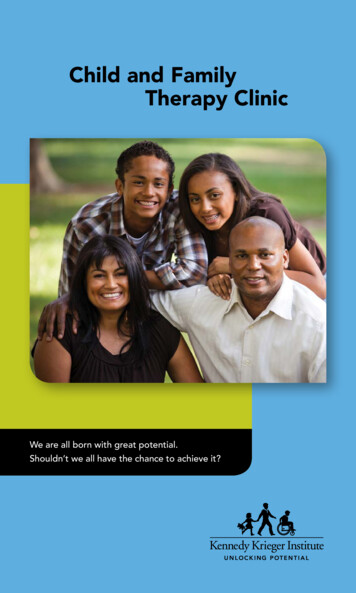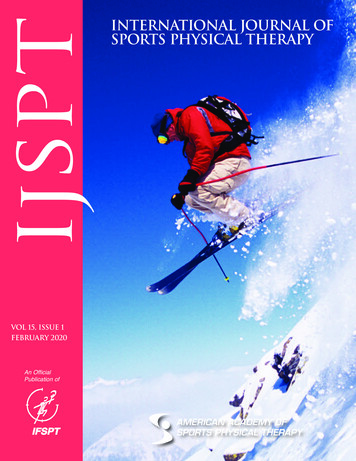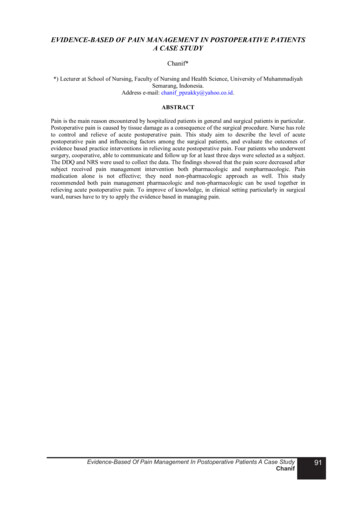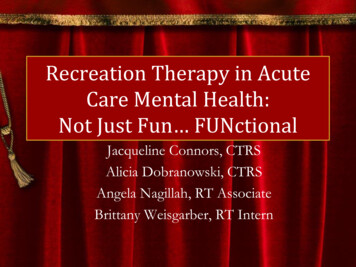
Transcription
Recreation Therapy in AcuteCare Mental Health:Not Just Fun FUNctionalJacqueline Connors, CTRSAlicia Dobranowski, CTRSAngela Nagillah, RT AssociateBrittany Weisgarber, RT Intern
Learning Objectives Participants will be able to understand the differencebetween Recreation Therapy and general recreation Participants will understand the role of RT in AcuteCare Mental Health Participants will be able to identify the benefits ofleisure Participants will be able to identify potential barriers toa healthy leisure lifestyle
Outline Who We Are, What We Do Our Focus Programs Evidence Dispelling myths Outcomes
What do you think of?
Happy Therapeutic RecreationMonth Did you know that February is TR month?Learn More! al-health www.traac.ca www.canadian-tr.org
Defined“Supporting purpose in life”-Bob Baird
The Pie of Life
Our Focus: Social Needs Decrease Isolation Support Relationships Improve Social Skills(Chrostek et al. 2016)
Our Focus Cont’d: Daily Structure Building a Routine and/or Schedule Get Back to Regular Routine Learn About Resources WorkHealthLife: ‘Return to work, friends androutine after mental illness’
Our Focus Cont’d: Engagement &Motivation Become more active and/or involved Help become motivated Explore new opportunities
Our lationshipGroupAfternoon1:15pmMusic 5amNewspaper Newspaper Newspaper 10:00amCraft upRelationship 2:00pm1:30pm12:15pmRelaxationGym (4thMusicKitchenGroupFloor)LessonsParty (every*Inpatient2:30pm3:00pm Art2nd week)andGymwith Laingoutpatient*House2:30pm(every m ArtGroupSaturdaySundayArt withVolunteersArt withVolunteers
Progression & Skill DevelopmentInpatient programs: Music group Music LessonsCommunity transitions: Our Jam Kitchen Party
Evidence Mood regulation and PA (Malhi & Byrow 2016)Symptom reduction (Iwasaki et. al 2014)Improved functioning (Haddock et al 2009)Increased self esteem (Haley & McKay 2004)Social cohesion (Fenton et al. 2017)Coping (Iwasaki et. al 2013)Community integration (Fenton et al. 2017;Stumbo et al. 2015)
Better Evidence“It was so nice to be welcomed withopen arms; to cook and learn aboutfood, sitting around the table with suchgood company”– 6 Lane Patient“It has indeed been a great pleasure for me having been involved in music group aswell as "Our Jam". Even at 66 it proved I can learn something new and to have myself-confidence enhanced.” – 6 Lane Patient
Dispelling MythsGroup dynamicsStaff to patient ratiosEnvironmentOff unit risksBuilding trust and rapportPatient interestsTreatment vs. leisureBehaviour management
Program Example Gym group- How long do you think it takes 1 staff to gather from 2 units?– How do you choose who goes?– How many staff/volunteer per patient?– Pass level considerations– Do you personal alarms work in the gym?– Where is the phone for emergency calls?– Equipment/patient limitations– How many exits are there in the gym? Where do they go to?– In case of fire, what do you do?– Typical behaviours in the gym
Behind the Scenes Writing grants/grantreports Budgets Purchasing supplies Program planning Volunteer management Transfer of care Meetings Acute care FTE designatedto PPL Supportingstudents/teaching classes Documentation Developing communitypartnership Community resourceeducation Training/education/research
Outcomes Decreased sick timeImproved unit mellieuGroup therapy less than 1:1Decrease aggression on units (Baker et al. 2012)Early engagement early discharge (Iwasaki et al.2014)
A Special Thanks to Mental Health Foundation: providing funding forprograms Community Discount Partners– Dartmouth Sportsplex: free day passes, reduced costmembership with referral from Recreation Therapy– Deserres: Zone Card– Recreation Nova Scotia: negotiable rates Therapeutic Recreation Journal: Accepted forpublication for
References Baker, H.F., Boudreau, T., Egan, M., Ingram, S., Behavior management support from theTherapeutic Assistant (TA) service for the acute care patient population at Dartmouth GeneralHospital. NSHA Quality Week Poster PresentationFenton, L., White, C., Gallant, K. A., Gilbert, R., Hutchinson, S., Hamilton-Hinch, B., &Lauckner, H. (2017). The benefits of recreation for the recovery and social inclusion ofindividuals with mental illness: An integrative review. Leisure Sciences. 39:1, 1-19.Chrostek, A., Grygiel, P., Anczewska, M., Wciorka, J., & Switaj, P. (2016). The intensity andcorrelates of the feelings of loneliness in people with psychosis. Comprehensive Psychiatry. 70, 190199.Haddock, G., Barrowclough, C., Shaw, J.J., Dunn, G., Novaco, R.W. & Tarrier, N. (2009).Cognitive-behavioural therapy v. social activity therapy for people with psychosis and a history ofviolence: randomised controlled trial. The British Journal of Psychiatry. 194, 152-157.
References Iwasaki, Y., Coyle, C., Shank, J., Messina, E., Porter, H., Salzer, M., Baron, D., Kishbauch, G.,Naveiras-Cabello, R., Mitchell, L., Ryan, A. & Koons, G. (2014). Role of leisure in recovery frommental illness. American Journal of Psychiatric Rehabilitation.17:2, 147-165Iwasaki, Y.; Coyle, C; Shank, J; Messina, E; Porter, H. (2013) Leisure-Generated Meanings andActive Living for Persons With Mental Illness. Rehabilitation Counselling Bulletin 57 (1) 46 – 56Malhi, G.S., Byrow, Y., (2016) Exercising control over bipolar disorder. Evid Based Mental Health.19:4, 103-105Slade Hofer, K. (August 18, 2001). The value of recreation therapy for women suffering witheating disorders. UHS Center for Change. Retrieved women-suffering-eating-disorders/Stumbo, N.; Wilder, A.; Zahl, M.; DeVries, D.; Pegg, S.; et al. (2015) Community integration:showcasing the evidence for therapeutic recreation services. Therapeutic Recreation Journal. 35-60Haley, L. & McKay, E. (2004) “Baking gives you confidence”:Users’ views of engaging in theoccupation of baking. British Journal of Occupational Therapy, 125-128
Questions“True quality of life is not found simply inimproved functioning, but in the discovery of ourhumanity through experiences of joyful freedomthat bring meaning and value to life”(Slade Hofer 2001)
Behaviour management. Program Example Gym group . Lauckner, H. (2017). The benefits of recreation for the recovery and social inclusion of individuals with mental illness: An integrative review. . Naveiras-Cabello, R., Mitchell, L., Ryan, A. & Koons, G. (2014). Role of leisure in recovery from


